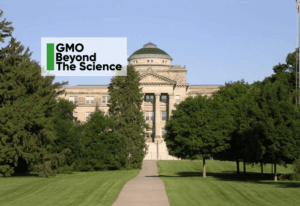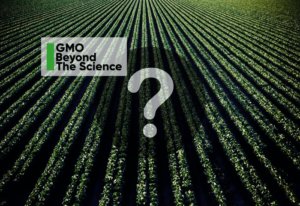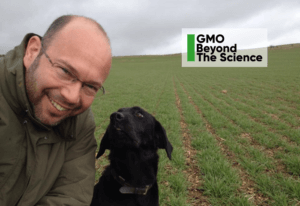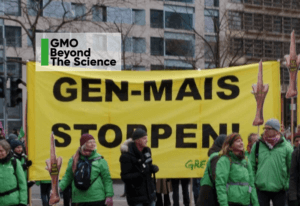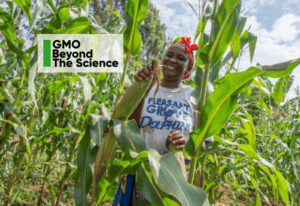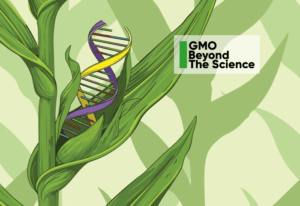


How the Green Party-Led Anti-Biotechnology Movement Captured German Policy and Why it Endangers Germany’s Future Innovation in Gene Editing

Wolfgang Nellen, Emeritus Professor of Genetics, University of Kassel | June 27, 2018
Highlights:
- Green Party’s opposition to biotechnology innovation began with its rejection of GMO insulin
- Greenpeace pledges in private meetings to back science but then publicly promotes scare imagery and misinformation
- Anti-GMO activists focused on stigmatizing CRISPR and other mostly cisgenic New Breeding Techniques by distorting the science and linking them to transgenic GMOs
The German opposition to biotechnology crystallized and became the trademark issue of the country’s Green Party when Hoechst asked for approval for a manufacturing plant to produce GMO insulin. The Hessian Länder-Government (a coalition of the Social Democrats and the Green Party) did everything to prevent this. GMOs, even to develop life-saving biomedical drugs, were often referred to as the ‘devil’s tool’. The Greens had many allies, including the influential “Gen-ethic Network,” one of the leading and most efficient opponents and fear-mongers.
The Green’s opposition to Hoechst’s German-produced insulin was eventually reversed in 1990, but it was not until 1998 that the product was finally greenlighted. It was too late. Eli Lilly already had started production in France, and Hoechst had decided to abandon its original plan to manufacture the drug in Germany, investing instead in a plant in Boston.
The opposition to “red biotechnology”—adapting genes to develop genetic medical innovations—faded in the 2000s when it became clear that the medical community and the public appreciated the products, and the benefits could no longer be covered up by irrational green campaigns. At about the same time, however, ‘progressive’ advocacy groups turned their ire towards “green biotechnology”—agricultural uses of biotechnology, including GMO crops.
The Green Party soon realized how profitable promoting ignorance could be; public opposition to GMO food became a central fund-raising tool for its opponents. The success was overwhelming. Anti-GMO advocates created scary new word creations like “gene-food”, “Frankenfood” and “gene manipulation,” emotion-laden scare imagery embraced and often gleefully promoted by the reputable media.
Greenpeace and other groups took to the farm fields. Experimental research crops were destroyed by activists in “field visits”. Field trials that could have resulted in yield-enhanced, nutrition-enhanced or disease resistant crops, or plants with other valuable traits, came under siege and were in some cases terminated (e.g. by Professor Wolfgang Friedt at the University of Gießen in 2008. Activists destroyed promising crop biotech field research at IPK Gatersleben. Several activists were arrested but charges were dismissed in 2013).
In Germany, legislation requires scientists to publish the exact location of a crop biotechnology field trial. As a consequence, it was absolutely predictable that anti-GMO activists would destroy any known experiment. Because of these rogue protests, since 2012 there have been no more field trials in Germany.
The regional governments of 14 out of 16 German states have declared they will be “free of gene technology” (by which they mean only GMOs as applied to farming; although the development of GMO drugs deployed the technology in an identical way, biomedicine was given a pass by regulators and activists).
For universities financed by the states, this officially means that no resources may be used for work on transgenic plants. This rule is not strictly implemented and research depends on outside funding anyway, but the message is clear.
Thirty years ago, Germany was the world leader in molecular plant science; now research and teaching is declining. To fill a professor position with a molecular plant scientist is difficult and “may cause trouble”—officially of course “there is much more need” for a scientist working on ecosystems or biodiversity (preferably not with molecular methods). In the end, there is even some logic in this shift of focus: the jobs for graduates from molecular plant science are largely gone, as companies have moved their research and development labs to other countries.
How did the anti-science movement become so successful?
In 2008 HannoverGen, a laboratory for schools was founded and financially supported by Lower Saxony (Land Niedersachsen). In 2012, green anti-biotechnology activists launched a campaign against the institution. It began with an article by the “independent” journalist Heribert Wefers, who was funded by several anti GMO groups and briefed by Greenpeace. Wefers argued that the lab was playing down the dangers of gene technology, was brainwashing school kids, and was financed by the “agro-industry”.
The local Greenpeace group jumped on the hysteria bandwagon (which they initiated!) and organized a massive protest of activists and (misinformed) citizens. These protests were picked up by the Green Party, which made keeping gene technology out of schools a central election campaign promise.
The commitment to close HannoverGen was actually included in the coalition agreement for Lower Saxony between the Greens and the Social Democrats. The lab was later re-opened with the condition that there would be no “gene” in the name and that they would not teach any genetic engineering. The teachers of the associated schools suggested the acronym “DNS” for “Das neue Schülerlabor” (the new school lab), but that was rejected by the government. At the same time, extensive “teaching materials” funded by anti-GMO foundations were spread across Germany.
Science Bridge, a school lab in neighboring Land Hessen that I co-founded, campaigns on behalf of science using “strong words” to attract attention and Zimmermann, as a trained molecular biologist, admitted that some of the campaigns distort some of the science. In an apparent attempt to bring the debate back to facts and a science-grounded discussion, Zimmermann agreed to write a joint article with Science Bridge explaining the difference between “campaign language” and scientific language. Science Bridge provided a draft as a basis for the paper. After one year of limited correspondence there was a final response from Greenpeace: the draft was unacceptable and there was no need for such an article.
This is just one of several examples: in small group discussions, some anti-GMO activists, especially those with a science background, appear reasonable and ready for a debate based on scientific facts. But when it comes to taking genuine actions, they back out. Campaigns generate money and power; since scientific debates distract from these main aims, science be damned.
Will CRISPR gene edited crops face the same fate?
After many years of anti-biotechnology brainwashing, the success of GMO opponents is almost absolute. Polls show the vast majority of Germans now reject green gene technology as “unacceptable.” A recent survey by the BfR (Bundesamt für Risikobewertung) on CRISPR/Cas gene editing has cast some more light on these results: 64 percent of the participants considered food from gene edited plants as “unhealthy”. But it was not an informed view; 95 percent of the participants had never even heard of genome editing before. The key words “gene”, “genome” and “gene technology” alone provoked an adverse reaction.

The “battle” for politically correct, anti-technology opinion now focuses on CRISPR. These new gene editing methods use molecular biology to change genes, but the results are mostly indistinguishable from natural mutations. There is also no way to distinguish CRISPR-mediated point mutations, small insertions or deletions from mutations induced by radiation or other environmental causes, which are not regulated (mutagenic crops, such as sweet grapefruits, are even sold as organics). Because there are no differences in the crops that result from many conventional breeding processes and CRISPR, scientists and many farmers hope that gene editing may eventually open the door to the cultivation of genetically improved plants.
Two parallel strategies are being pursued by activists to prevent common-sense science from prevailing.
1. Testbiotech provides a veneer of science for the Green’s anti-GMO activities. It’s lead by former Greenpeace activist Christoph Then and funded by several foundations that explicitly support anti-GMO organizations. Then is a veterinarian who wrote his PhD thesis on homoeopathic treatment of animals. He is accepted as an “independent expert on gene technology” by the German media.
Testbiotech coined the phrase “extreme gene technology” in an attempt to demonize CRISPR. This implies that the risks are even larger than those of conventional gene technology and that all arguments against conventional gene technology are even stronger when it comes to CRISPR—which in fact is exactly the opposite of what the science holds. One of its arguments is especially powerful: “Science cannot provide any proof that gene technology has no risks.” Due to the lack of science education (in part caused by anti-GMO activities), citizens are not aware that there is no scientific proof for the absence of something. Nevertheless, this flawed reasoning has led to the popular embrace of the precautionary principle: we should prohibit any technology which is not 100 percent safe.
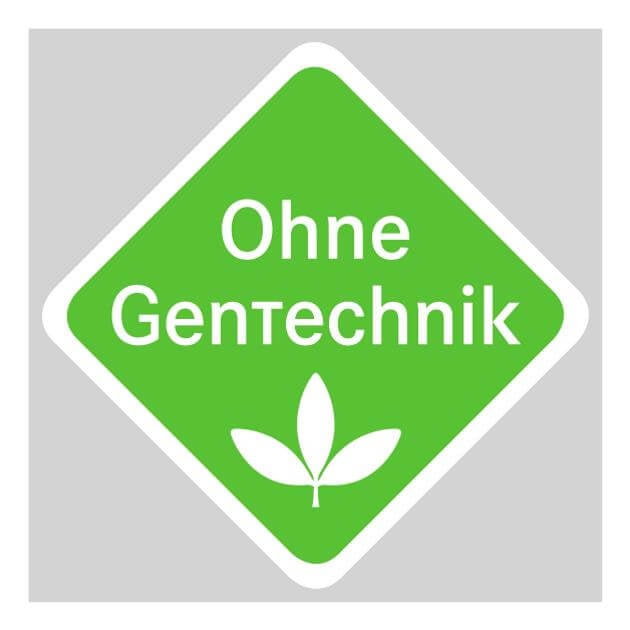
2. The second strategy is to encourage consumers to reject “gene food”. The campaign is led by VLOG (“Verband Lebensmittel ohne Gentechnik”, food without gene technology), which provides the label “without gene technology” for food products (especially cheese, yogurt, poultry, meat, and eggs) that have been produced without GMO (although even those “GMO free” animals were fed a steady diet of GMO soy before the animals began production of eggs or milk or were slaughtered for meat; in other words, the “GMO free” claim was always deceptive).
The non-GMO certificate has become very successful and covers food products worth €4.400.000.000. Major supermarket chains like Rewe, Edeka, Aldi and Lidl use the label on an ever-increasing number of items. In some towns it is impossible to buy milk products without it. VLOG, Greenpeace and others argue that there is increasing demand for “food without gene technology”—no wonder, when there is nothing else to buy! Ironically and hypocritically, activists who impose extreme pressure on companies and markets to embrace the label have now completely abolished the “freedom of choice” motto that they once championed when they began their campaigns to market “GMO-free” products.
To make Germany a “GMO-free” country has not been easy. The European Union issues safety examinations and permits to grow plants in the field. EU members cannot reject approved seeds because the approval process was carefully done by EU authorities. However, new opt-out guidelines were established in 2015, which allow EU member states to prohibit cultivation of GMO crops, but explicitly not for scientific reasons. Conservation of landscape and ecosystems, environmental issues, traditional farming or other regional specifics are sufficient to enforce “GMO-free” agriculture. Germany has used the opt-out guidelines to prohibit cultivation of the GMO corn variety Mon 810 in the entire country and has announced opt-out applications for all other new GMO seeds.
It is almost certain that Germany will insist on similar opt-out guide lines if CRISPR is approved as a non-GMO process by the EU, which is what appears likely to happen. With less costly and less time consuming regulation, small companies could flood the market with innovative gene edited crops and foods, and demonstrate to the public the safety and benefits of genetic engineering. That would destroy a core issue of the Green Party and may break its back.
Careful attempts by the new Green leadership Robert Habeck and Annalena Barbock to reconsider their blanket opposition to crop biotechnology were met by strong opposition from within their party; they appear locked into their anti-biotechnology position. That could prove politically catastrophic. Over the years, political parties across the ideological spectrum have gradually adopted Green positions on this issue. As a result, Germany actually pursues official Green policies on controversial science issues although the party is not part of the Christian Democrat–Social Democrat coalition. It is quite unusual that a ruling government implements the aims of an opposition party.
Regulatory way forward?
The debate whether editing is “gene technology” or not is a legal issue and not a science one. If gene edited plants are considered GMOs they are subject to long-standing GMO regulation, which means 10 to 15 years to obtain approval at a potential cost of hundreds of millions of Euros. Even then, final approval is unlikely because of the opt-out rules.
The key issue for gene editing is whether new products will be evaluated on their own terms or whether they will face regulation based on how they were produced. In Germany, in contrast to the United States, the process by which a product is made, and not the product itself, determines its regulatory status. That means almost identical products will undergo very different safety tests. For example, a sunflower that synthesizes high amounts of unsaturated fatty acids by antisense inactivation of a desaturase gene will be examined by the rules for genetically modified organisms. A sunflower with the same trait but caused by unknown random mutations and traditional breeding—but otherwise 100 percent identical—does not require the long-lasting safety checks and can be marketed with no oversight.
Another issue is how to monitor genome-edited plants (or animals). In many cases, mutations introduced by CRISPR cannot be distinguished from natural mutations. The re-insertion of “lost genes” is also an issue. For example, during conventional breeding of non-GMO tomatoes, several genes responsible for the aroma were accidentally lost because they were very close to ripening genes that were selected for. Inserting the lost gene variants in exactly the position where they were located before could be considered a repair of a “breeding accident”. The re-introduction of “lost genes” could theoretically be achieved by very laborious Mendelian genetics. Gene editing would be a snap, and far less costly with exactly identical results.
Most likely, however, this benign use of gene editing will be considered GMO-type technology and would have to undergo lengthy safety evaluations. In other words, restoring the taste and fruitiness of tomatoes, degraded by conventional breeding, could be near impossible ifthe EU’s process-based GMO regulatory structure is imposed on gene edited crops.
There are only very drastic (and almost impossible) ways to regulate CRISPR, according to the current GMO legislation: a constant monitoring of plant science labs to ascertain that the method is not being used on crop plants or prohibiting the entire technology in Germany. But this would still not solve the faux problem because GMO seeds could be imported and would not be detectable.
In any case, the uncertainty of how CRISPR will be regulated in the EU and especially in Germany (ongoing since 2016), is not a good climate or incentive for start-up companies with fresh ideas. In fact, as outlined in a satirical letter by Reinhard Szibor to NGOs and political parties, settling on stricter regulations or even postponing or delaying a decision, will strengthen the few big companies left that produce GMO seeds. Under the current conditions they are the only ones that can afford the approval process. So anti-GMO activists will confirm the very nightmare scenario that they campaign against: ensuring that the newest seeds are ‘controlled’ by large agribusiness.
The current situation is bad news for science and there is no reason to believe this will change in the foreseeable future. Though Germany is still strong in engineering and science, its decline, especially in biosciences, appears predictable and inevitable. Restrictive regulations slow down research and development. Before long, it will be too late to preserve innovation. The new centers of science are already emerging in Asia, China in particular. Germany and all of Europe will no longer be seriously competitive.

Wolfgang Nellen, Emeritus Professor of Genetics, University of Kassel. He received his doctorate in biology from Düsseldorf University. He worked as a postdoc at Marburg University, as a research assistant at the University of California, San Diego and as a group leader at the Max-Planck Institute for Biochemistry in Martinsried. From 1996 to 2015, he was Professor of Genetics at Kassel University working on epigenetics and regulatory RNAs. He was president of the German Genetics Society (GfG) and the German Association of Biologists (VBIO). From 2010 to 2017, he was head of the Indonesian-German-Network for Biosciences. In 1997, he founded Science Bridge, an association for public understanding of science, for which he is a spokesperson.
Global Farmer Network (GFN) is a non-profit advocacy group led by farmers from around the world who support free trade and farmers’ freedom to choose the tools, technologies and strategies they need to maximize productivity and profitability in a sustainable manner. Established in 2000, the Global Farmer Network is committed to inserting the worlds farmers voice in the global dialogue regarding food and nutritional security. The Global Farmer Network identifies, engages and supports strong farmer leaders from around the world who can work with others to innovate, encourage and lead as full stakeholders in the work that is being done to fill the world’s food and nutrition security gap in a sustainable manner.
The Genetic Literacy Project is a 501(c)(3) non profit dedicated to helping the public, journalists, policy makers and scientists better communicate the advances and ethical and technological challenges ushered in by the biotechnology and genetics revolution addressing both human genetics and food and farming. We are one of two websites overseen by the Science Literacy Project; our sister site, the Epigenetics Literacy Project, addresses the challenges surrounding emerging data-rich technologies.

